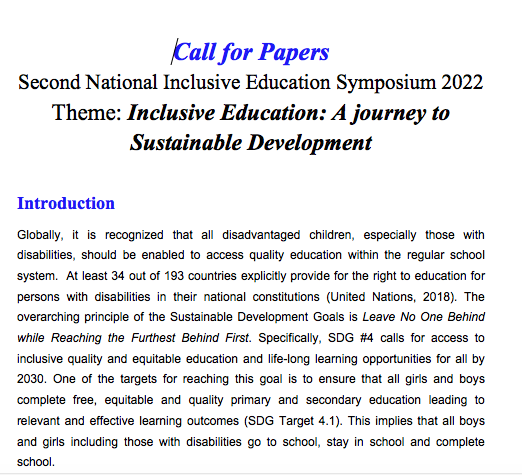Call for Papers: Second National Inclusive Education Symposium 2022
Theme: Inclusive Education: A journey to Sustainable Development
Introduction
Globally, it is recognized that all disadvantaged children, especially those with disabilities, should be enabled to access quality education within the regular school system. At least 34 out of 193 countries explicitly provide for the right to education for persons with disabilities in their national constitutions (United Nations, 2018). The overarching principle of the Sustainable Development Goals is Leave No One Behind while Reaching the Furthest Behind First. Specifically, SDG #4 calls for access to inclusive quality and equitable education and life-long learning opportunities for all by 2030. One of the targets for reaching this goal is to ensure that all girls and boys complete free, equitable and quality primary and secondary education leading to relevant and effective learning outcomes (SDG Target 4.1). This implies that all boys and girls including those with disabilities go to school, stay in school and complete school.
Uganda is obliged to comply with Article 24 of the United Nations Convention on the Rights of Persons with Disabilities (CRPD) which requires all States parties to ensure an inclusive education system at all levels of education and to ensure that persons with disabilities can access an inclusive, quality primary and secondary education on an equal basis with others (United Nations, 2006). Uganda has registered some commendable legislative strides to promote inclusive education at all levels. In addition to Universal Primary Education and Universal Secondary Education, the Government of Uganda established an affirmative action scholarship scheme to sponsor 64 persons with disabilities at public universities since 2002, and has pledged to increase this scholarship scheme to more than 300 by 2023. Nevertheless, persons with disabilities still encounter numerous challenges in the education system. The literacy rate of persons with disabilities (55%) is 20 percentage points lower than the national literacy average (UBOS, 2014), while only 6% of the children with disabilities who enroll in primary school transition to secondary education (UNICEF 2014). In its concluding observations, the UN Committee on the Rights of Persons with Disabilities (2016) observed that Uganda prioritizes segregated education arrangements over inclusive education systems, many school infrastructures do not meet the accessibility requirements for children with disabilities and there is a lack of trained teachers to promote inclusive education at all levels. Weak implementation of policies is arguably the most significant barrier hindering the realization of the right to education for persons with disabilities in Uganda. The second National Inclusive Education Symposium taking place on 7th and 8th of December 2022 is intended to provide a national platform for stakeholder meaningful engagement to reflect on inclusive education policy and practice in light of the CRPD obligations and SDG and Global Disability Summit commitments.
Symposium Venue: Silver springs Hotel, Bugolobi, Kampala, Uganda
Sub-themes
Academic and practical papers covering the following topics on inclusive education are welcome in the form of posters, individual and panel presentations:
- Policy and legislative trends in Uganda (past, present, and future policy developments)
- Identification and assessment of learners with special needs at all levels including non-formal education (progress, challenges, and prospects)
- Assessment of learning outcomes
- Accessibility of school infrastructure, instructional materials, curriculum contents, textbooks and other learning resources.
- Inclusive pedagogies
- Reasonable accommodations for learners with special needs/disabilities
- Teacher education and training, continuous professional development and other capacity-building initiatives to support inclusive education
- Financing of inclusive education (progress, gaps, and prospects)
- Assistive technologies (high tech, low tech, low cost and high cost) for enhancing learning for learners with special needs/disabilities
- Monitoring and evaluation for effective implementation of sustainable inclusive education (participation, access, achievements, progress, challenges, and prospects)
- Implementation of inclusive education in challenging times/settings such as the public health emergencies, conflict, refugee settlements, natural disasters, etc.
- Cultural diversity and inclusive education
- Stakeholder engagement and partnership in inclusive education
- Psychosocial support and behavioral management
Important dates
| Issuance of call for papers | November 1, 2022 |
| Deadline for submission of abstracts: | November 15, 2022 |
| Notification of successful abstracts | November 20 , 2022 |
| Last date to register for symposium | November 25, 2022 |
| Last date to submit full presentation (poster, powerpoint or paper) | November 30, 2022 |
| Symposium days | December 7-8, 2022 |
Symposium mode: blended (physical and virtual/online)
How to submit abstracts:
- Abstracts not exceeding 250 words should be sent via the following google form link: https://forms.gle/b3Zb7qhXfkKPBXNdA
- Should you not be able to use the google form, then please send the following in a Word or PDF document to inclusiveeducationsymposium@gmail.com:
- First & last name
- Title
- Place of work
- Position
- Email address
- Phone number
- Country of residence
- Short biography (max. 150 words)
- Abstract (max. 250 words)
Contact persons:
- Patrick Ojok: E: pojok@kyu.ac.ug; Mobile: 0773181655
- Annemaaike Kruisselbrink: E: annemaaike@backupuganda.org; Mobile: 0778089583



